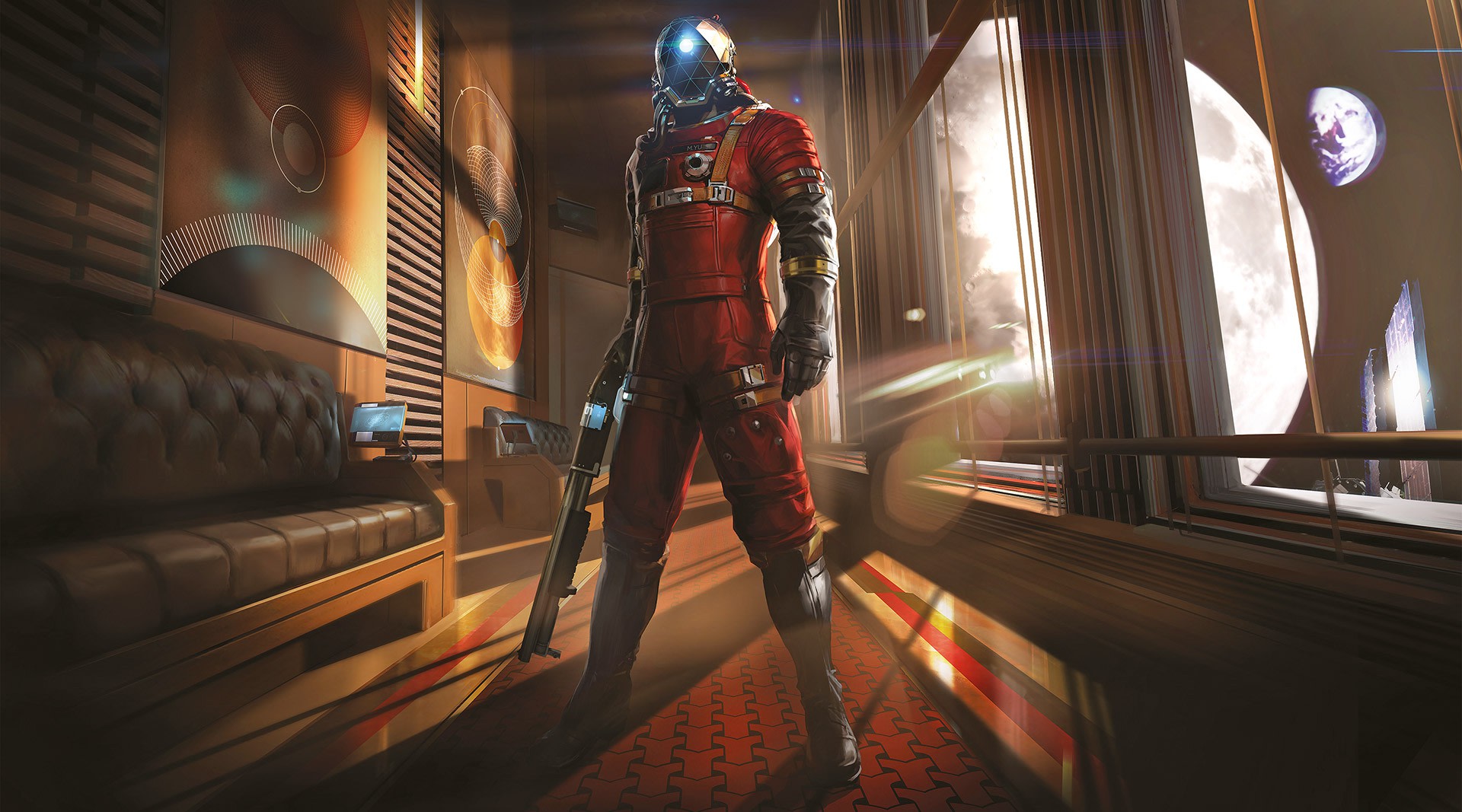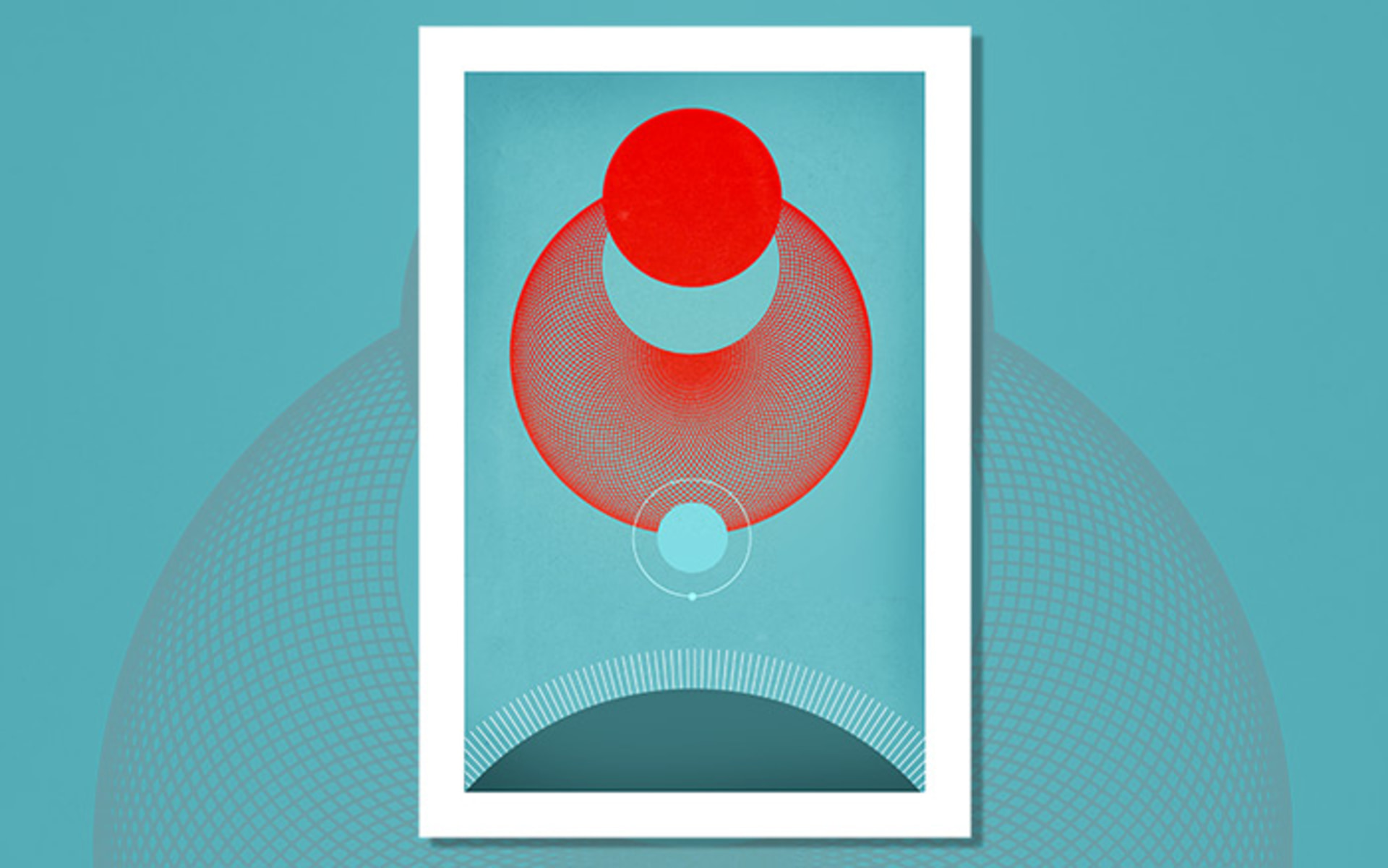PREY (2017) is a sci-fi themed game set in the year 2035 developed by Arkane Studios Austin, in an alternate timeline where decades of space exploration left humanity with a giant, semi-abandoned space station called Talos I orbiting the moon. Players are charged with exploring the vast structure, fighting a race of formless and shape-shifting aliens as they gain a deeper understanding of Talos’ many mysteries.

article
The Neo-Deco Future of PREY
Arkane Austin fuses Kennedy-Era Glamour and Retro-Futurism with Eastern Block Brutalism. In space.
Arjan Terpstra
17 Nov 2017 ⋅ 4 min read
The art on Talos I is strongly inspired by 1950s and 1960s art. Cook and Becker reproduced four Fred Augis' 'Talos I art paintings' - as can be seen aboard the Talos 1 spacecraft - as limited edition art prints.
Visual styles
Arkane Studios - also known for the DISHONOREDd and DEATHLOOP games has developed a unique artistic voice in the world of video games characterized by expressive and distinctive visual styles. Arkane honed a design practice that is as focused on finding original narratives as it is on novel gameplay and interaction. PREY is no different from the much-lauded DISHONORED games, in that it too utilizes a well-grounded design aesthetic to immerse the player, fortified by a strong art direction on character and environment designs, game music and the like.
Narrative
As the spaceship Talos I is central to the game, the designers focused on developing fresh angles to time-honored cultural tropes involving extraterrestrial encounters and abandoned space stations. Key to finding the right narrative and a fitting design aesthetic was the development of an alternate timeline; a history in which American president John F. Kennedy survives the assassination attempt on his life, and doubles down on the ‘Space Race’ with the Soviet Union of the 1960’s, stepping up extra funding for space exploration. Later on, the Soviets join the Americans when an alien species is discovered in space, and Moscow and Washington agree to share resources to research into these on Talos I. Later, both governments back out of the space program, and the privately owned company TranStar takes over, commercially exploiting the scientific knowledge about the oddly behaving and shape-shifting alien creatures.
Portrait of PREY's main character Morgan Yu (cropped). The full image is available as a museum-grade art giclee print.
The design of Talos I closely follows this alternate timeline. At the center of the immense space station sits the ‘Kletka’ station built by the Soviet Union in the 1950’s, a sparse and claustrophobic affair. Adjacent constructions are government-issued laboratories of Soviet and American origin, followed by several additions built by the TranStar company. Every new one is more lush, spacious and luxurious than the one before, as the company over time needed new and better incentives to lure top scientists to the station.
Art Deco
As a result, this is a space station that sits miles apart from other imaginations of future life in space. Instead of the military-issued, bare-minimum, ‘submarine’ aesthetic we find in many of the more aggressive science fiction, Talos I is a place of refined beauty, full of art deco flourishes. And even though it’s a science station, Talos stays far from ‘research facility’ tropes of clean labs and white lights: spacious halls are decked with marble and wooden floorboards, as scientists find ample room to relax in a luxurious atmosphere. Props adorning the rooms expand on the functionality of the space station: leather hotel lobby seats are everywhere, as are ash trays or bedside books in the now-abandoned quarters of scientific staff.
Talos I, in its totality, feels consistent, contiguous, and well-considered, from the retro-futuristic uniforms player characters don to the geometric art prints that are on show throughout the station. Both are strong re-imaginations of mid-20th century fashions, with strong overtones of posh, Kennedy-era art deco hotel lobbies, optimistic American retro-futurism, and elements of darker, Eastern Bloc brutalist styles. Together, they are the material expression of a prolonged accelerated space program, and tell of a thriving scientific endeavor, with top scientists happily working on the progress of humankind before something went horribly wrong.
Art Deco
As a result, this is a space station that sits miles apart from other imaginations of future life in space. Instead of the military-issued, bare-minimum, ‘submarine’ aesthetic we find in many of the more aggressive science fiction, Talos I is a place of refined beauty, full of art deco flourishes. And even though it’s a science station, Talos stays far from ‘research facility’ tropes of clean labs and white lights: spacious halls are decked with marble and wooden floorboards, as scientists find ample room to relax in a luxurious atmosphere. Props adorning the rooms expand on the functionality of the space station: leather hotel lobby seats are everywhere, as are ash trays or bedside books in the now-abandoned quarters of scientific staff.
Talos I, in its totality, feels consistent, contiguous, and well-considered, from the retro-futuristic uniforms player characters don to the geometric art prints that are on show throughout the station. Both are strong re-imaginations of mid-20th century fashions, with strong overtones of posh, Kennedy-era art deco hotel lobbies, optimistic American retro-futurism, and elements of darker, Eastern Bloc brutalist styles. Together, they are the material expression of a prolonged accelerated space program, and tell of a thriving scientific endeavor, with top scientists happily working on the progress of humankind before something went horribly wrong.
Hazards
The end result is a space station full of aesthetic dualities. The purity of its classy design is offset by the environmental hazards players encounter. Flawless design shapes and bright color schemes are countered by the fluid, ink-black forms of the aliens. This duality extends into the way this lush environment is populated. Crew quarters are without crew, the swimming pool is without swimmers. In this sense, the art of PREY, in all its beauty, splendor and intricacy, serves only one purpose: to let players intuitively feel something is very wrong with this station.
The PREY fine art print collection is available from our store. For more Bethesda video game prints, visit our Bethesda gallery. Click the gallery links for details on individual prints, pricing details, finish options, availability, and sizes. Worldwide shipping.
The end result is a space station full of aesthetic dualities. The purity of its classy design is offset by the environmental hazards players encounter. Flawless design shapes and bright color schemes are countered by the fluid, ink-black forms of the aliens. This duality extends into the way this lush environment is populated. Crew quarters are without crew, the swimming pool is without swimmers. In this sense, the art of PREY, in all its beauty, splendor and intricacy, serves only one purpose: to let players intuitively feel something is very wrong with this station.
The PREY fine art print collection is available from our store. For more Bethesda video game prints, visit our Bethesda gallery. Click the gallery links for details on individual prints, pricing details, finish options, availability, and sizes. Worldwide shipping.

